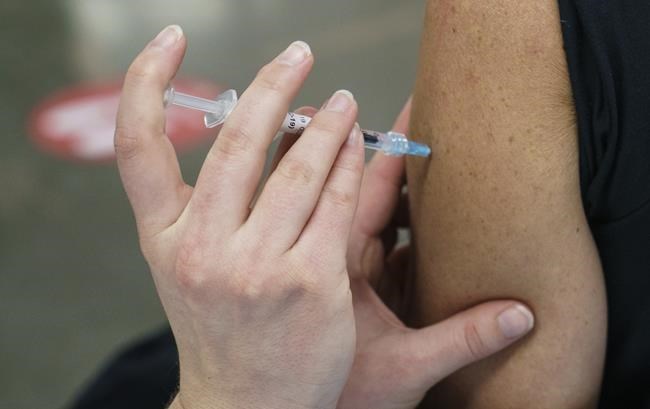MONTREAL — Lucie Tremblay wants her colleagues in Quebec's health-care sector to get vaccinated against COVID-19.
The head of nursing at the regional health board for west-central Montreal has taken a leading role in the board's efforts to reduce vaccine hesitancy among its employees.
Tremblay said some of her colleagues are still reluctant to get an injection, but they are noticeably fewer than a few months ago. “There's a lot of people that are very enthusiastic about getting the vaccine, but they're not yet on the priority list,” she said in a recent interview.
Health experts say vaccine hesitancy appears to be dropping among health-care workers in Quebec. “There's been a dramatic change," Dr. Melissa Genereux, public health professor at Universite de Sherbrooke, said in an interview Wednesday.
Quebec health boards are making a concerted effort to encourage workers to get vaccinated by launching information campaigns and creating programs aimed at turning vaccinated workers into role models for their colleagues.
Those efforts seem to be working.Â
Genereux said 76 per cent of Quebec health-care workers who responded to a survey between Feb. 5 and 16 said they had received a dose of vaccine or planned to get one. That’s up from 57 per cent in November, she said.Â
“In November, health-care workers were less inclined to receive the vaccine when compared to any other adults in Quebec, so this was quite disturbing,” said Genereux, who is also a medical adviser to the public health authority in Quebec’s Estrie region.
More than 10,000 Quebec adults participated in the survey, which was part of a two-year research project funded by the Canadian Institutes of Health Research, results of which have not yet been published.Â
Seeing colleagues get vaccinated with no major side effects — and witnessing the number of new COVID-19 cases decline as the vaccination campaign continues — has helped change attitudes, Genereux said. She also credits educational efforts by the Health Department and regional public officials.Â
At the west-central Montreal health board, much of the effort to encourage vaccination has focused on educating workers, Tremblay said. "They want to know more about the vaccine, they have questions, and I think it's very legitimate."
The board has set up a hotline where health workers can ask nurses and pharmacists questions about the vaccine; informational videos have also been created featuring doctors and the board’s CEO.
Workers who are vaccinated are offered a badge to wear to encourage their colleagues to get a jab, Tremblay added. “There might be a lack of trust regarding the vaccine, so if you see that your colleague got the vaccine and everything went fine and they're happy about it, they may also be encouraged to take it,” she said.Â
Eve Dube, a medical anthropologist at Universite Laval, said research has shown that when health-care workers encourage their colleagues to get vaccinated, it can lead to higher rates of flu vaccination.
Dube said her research also indicates that health-care workers in the province are increasingly willing to be vaccinated against COVID-19.
The fact the vaccine is new is likely playing a role in hesitancy, she said, adding "nobody wants to be a guinea pig." But as the vaccine becomes normalized, workers are more likely to want to get the shot, Dube said.
Ginette Senez, with the regional health board in south-central Montreal, said her organization is creating videos with a wide variety of staff members — ranging from doctors to orderlies — who are answering questions from colleagues and explaining how the vaccination process works.
Health-care workers are worried about the side effects and some are afraid they could get the virus from the vaccine, Senez said in a recent interview. Little by little, however, people's opinions are changing, she added. “Every week, we increase the number of people who have been vaccinated."Â
Convincing health workers to get injected is still a work in progress, she said, adding that only 41 per cent of staff who care for patients in long-term care centres have received the first dose of vaccine. Â
But, Dube said, vaccine rates may be lagging intention. "Practical barriers can have a huge influence on whether you will transform your intention into action," she said.Â
Many health-care workers in Quebec already work long hours and face mandatory overtime, she said, adding that if they have to schedule an appointment at a health-care centre other than their workplace, getting the shot may be a challenge even if they want it.Â
This report by The Canadian Press was first published Feb. 25, 2021.
—â¶Ä”â¶Ä”
This story was produced with the financial assistance of the Facebook and Canadian Press ߣÄĚÉçÇř Fellowship.
Jacob Serebrin, The Canadian Press




